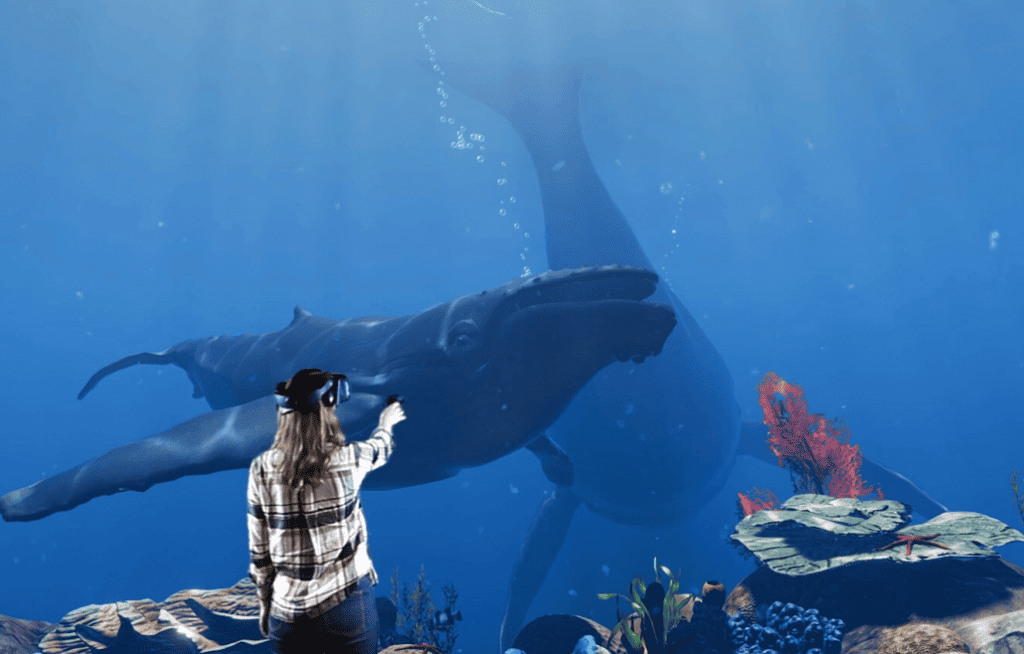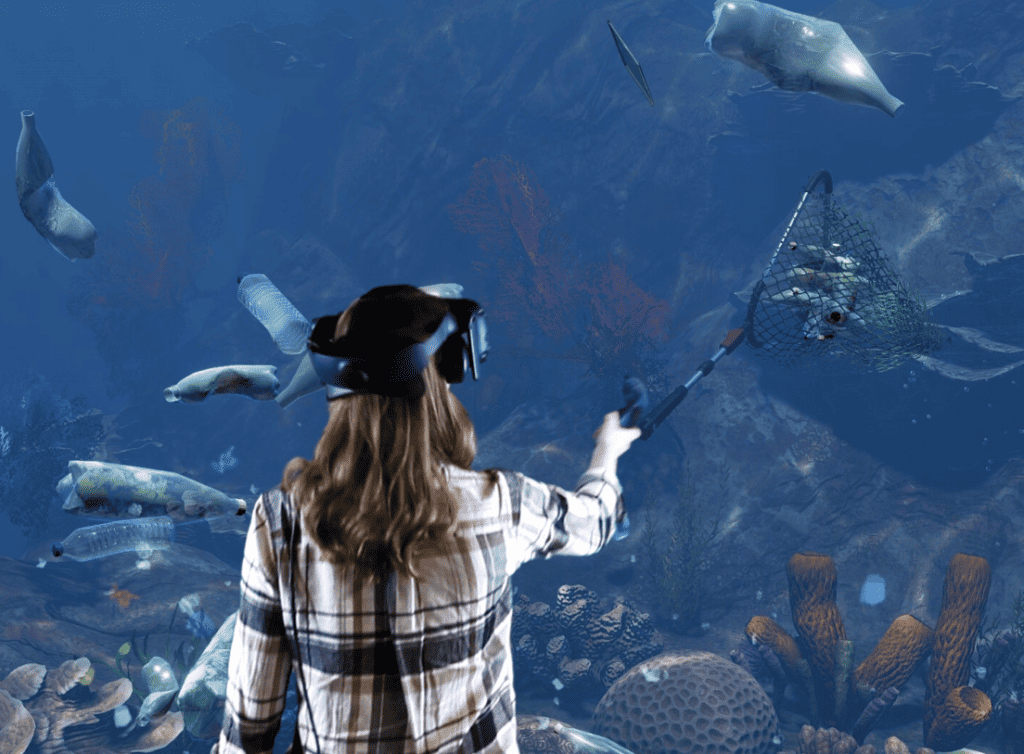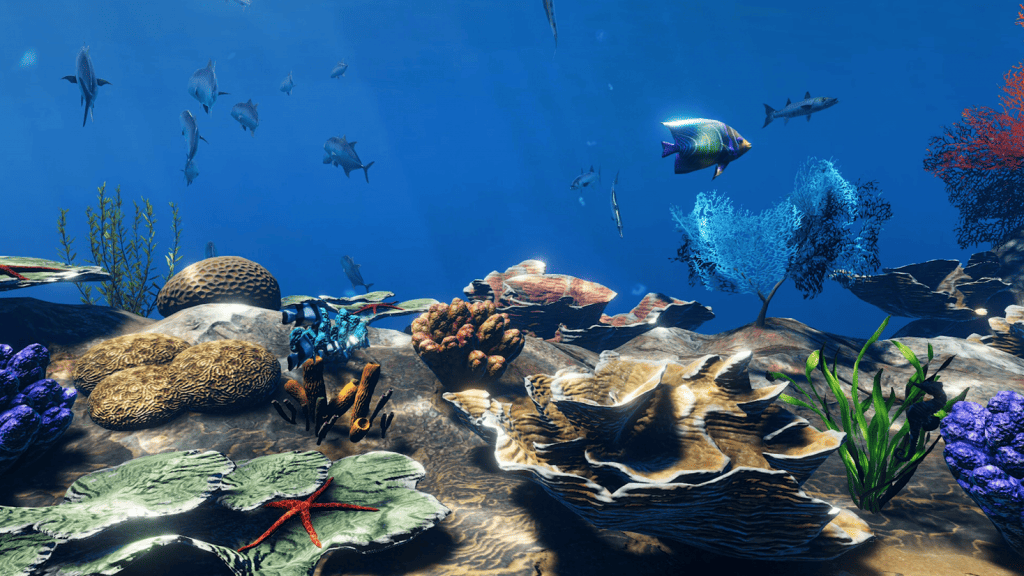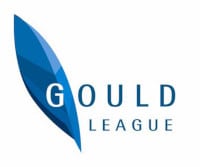The GOOD the BAD and the UGLY of PLASTIC Incursion incorporating Soda Stream’s “Ocean of the Future” virtual reality experience.
-
Plastic Waste
-
Human Impacts
-
Science Inquiry
-
Citizenship
-
Design and Technologies



Program Overview
This hands-on program explores our role as global citizens using the example of marine plastic pollution. The program takes students through three activities designed to highlight different aspects of our use of plastic – the Good the Bad and the Ugly. Students will look at how actions they take can prevent and treat the problems associated with marine plastic pollution and have the opportunity to envisage the future of the ocean using virtual reality headsets – The Ocean of the Future – that takes them under the ocean to see the problem from the perspective of the ocean and the creatures that depend on it.
Module 1: OCEAN OF THE FUTURE Virtual Reality Experience and Poster Design
Students will use the virtual reality experience to gain an insight into the problems caused by plastic waste entering our oceans and will develop a Call to Action in the form of a Poster in terms of steps they and their fellow students can follow to prevent this.
Module 2: Preventing waste in our Oceans
Students will discover how waste enters the oceans and explore what happens to it when it gets there and the impact it has on the marine environment. They will also learn actions that can be taken by individuals and communities to prevent this.
Module 3: Innovation. How we can upcycle waste before it gets into our oceans
In this module students will explore the use of waste materials as a resource for design and production of alternate products and have an understanding of the negative and positive impact that human actions can have on the marine environment.
Call to Action
Students are empowered to create positive change that will benefit our shared environment.
Duration: 1.5 hours
Inclusions and Notes
Certificate and Conservation Code to reinforce learnings
Post event, schools will be issued a Certificate of Participation and Conservation Code for each class which students are encouraged to sign and hang in the classroom as a reminder of their learnings and their commitment to protect the environment.
We encourage schools to connect with us a few weeks or months after school excursions to share behaviour changes made by the students or activities undertaken as a result of their learnings during their program so we can share success stories to inspire others, monitor the ongoing impact of our programs and make relevant updates or changes if required.
What to provide
Multi-purpose room large enough to comfortably accommodate all students in one group and in three separate groups without problems associated with noise from each group or alternatively three separate rooms that are proximate to one another
A3 poster paper, Textas/coloured markers / pencils
Parent or Teacher Aid to supervise one activity
Restrictions
Program timing considerations: Groups of no more than 30 students in total will be broken down into 3 subgroups of 10 student max each to undertake each module which is why we require an aid. Gould League Educators require 10-minutes between groups/classes to reset activities and a 30-minute break for lunch when more than 2 groups are booked.
Curriculum Links
Civics and Citizenship: Citizenship, Diversity and Identity
– Investigate how people with shared beliefs and values work together to achieve their goals and plan for action (VCCCC016)
– Examine the concept of global citizenship (VCCCC017)
Design and Technologies: Technologies and Society
– Investigate how people in design and technologies occupations address competing considerations, including sustainability, in the design of solutions for current and future use (VCDSTS033)
Design and Technologies: Creating Designed Solutions
– Negotiate criteria for success that include consideration of environmental and social sustainability to evaluate design ideas, processes and solutions (VCDSCD041)
Economics and Business: Consumer and Financial Literacy
– Consider the effect that the consumer and financial decisions of individuals may have on themselves, their family, the broader community and the natural, economic and business environment (VCEBC005)
Geography: Geographical Concepts and Skills
– Describe and explain interconnections within places and between places, and the effects of these interconnections (VCGGC087)
Geography: Geographical Knowledge
– Factors that influence people’s awareness and opinion of places (VCGGK097)
Science: Science Understanding
– The growth and survival of living things are affected by the physical conditions of their environment (VCSSU075)
Science Understanding: Chemical Sciences
– Changes in materials can be reversible, including melting, freezing, evaporating, or irreversible, including burning and rusting (VSSCU077)
Science: Science Inquiry Skills
– Communicate ideas and processes using evidence to develop explanations of events and phenomena and to identify simple cause-and-effect relationships (VCSIS088)
The Victorian Curriculum F-10 content elements are © VCAA, reproduced by permission. Victorian Curriculum F-10 elements accurate at time of publication. The VCAA does not endorse or make any warranties regarding this resource. The Victorian Curriculum F-10 and related content can be accessed directly at the VCAA website.
